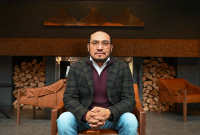Support strong Canadian climate journalism for 2025
One sunny Saturday morning in Newmarket, Ont., about an hour’s drive north of Toronto, a wok of pork bones and water slowly rises to a boil on the shiny black range of Rebecca Cui’s electric stovetop.
When the water boils, Cui moves the blanched bones to her electric pressure cooker, which she fills with fresh water and sets it to simmer. It’s not how her mother would have made bone broth, but Cui says it’s the best she can do with her wok and electric range. Cui, who learned to cook on an open flame in northern China, longs for a gas range that would let her cook how her family has for generations.
North American cities are starting to veer away from gas appliances in an effort to reduce greenhouse gas emissions, which cause global warming and have been linked to health risks. Gas-burning appliances often burn methane, a powerful greenhouse gas with about four times the global warming potential of carbon dioxide.
According to Natural Resources Canada, gas ranges in homes across Canada emitted about 370,000 metric tons of carbon dioxide equivalent in 2020. That’s equal to the emissions from burning 2,000 railcars worth of coal, according to the United States Environmental Protection Agency. This does not account for the methane gas emissions that have been found to unintentionally leak out of ranges. Emissions from gas ranges account for about 0.6 per cent of the total emissions from Canadian homes that year — in contrast, space heating accounted for about 64 per cent of residential emissions.
Gas ranges also release nitrogen oxides, such as nitrogen dioxide, which have been linked to triggering asthma.
Nonetheless, efforts to ban gas stoves are being met with fierce pushback from many corners, including some Asian cooking aficionados.
Vancouver had plans to ban natural gas hookups in new buildings, however, city council rejected the motion on May 31.
Vancouver Mayor Ken Sim noted the motion might stop people of Asian descent from cooking culturally appropriate foods at home.
“Taking away the ability of individuals of certain cultural groups to perform one of the most basic functions — making their own culturally appropriate foods — to me doesn’t really sit very well,” Sim said. “If the only option for people of Chinese descent or South Asian descent or Asian descent is to enjoy their food at a restaurant, as opposed to their own home, I find it incredibly problematic.”
Montréal’s commission on water, environment, sustainable development and large parks recommended the city ban installation of new gas-burning appliances. In April, the municipality of Laval, Que., said it was drafting a bylaw against the installation of new gas appliances.
Across the border, Seattle, Berkeley and New York City have started to eliminate gas hookups in new developments. However, a federal appeals court overturned Berkeley’s ban on gas appliances in new construction and the U.S. House of Representatives moved to stop regulation against gas stoves as a hazardous product.
Cui says bylaws against gas appliances would stop her from getting the equipment she needs to cook culturally relevant food.
“My mom's dishes are my favourite, but I cannot mimic them very well because I use different materials here,” Cui said. “Here I have an electric stove, so it's a different condition — the flavour will be different.”
Cui grew up in the Heilongjiang province of China in a home with a big brick coal-burning stove. With a proper wok on an open flame, Cui’s mother could feed a family of five. Cui said she can only make enough food for her family of three using her electric wok, which only delivers heat to the bottom of the pan — not its sides.
In its base, she would cook stir fries, stews and soups. Above the main dish, along the wok’s searing sides, her mother would stick savoury flatbreads made of cornmeal. Below the wok, Cui’s mother would place a rugged stone pot on the stove’s coals to boil a side dish.
Barry Tsang, an instructor of Asian culinary arts at Vancouver Community College, said although Asian cooking often uses gas stoves, he is not sure the gas makes a difference to the flavour. Instead, Tsang said induction stoves distribute heat differently.
Stir fries require meat and vegetables to be tossed around in a piping-hot wok, which would burn the food unless constantly in motion. The technique needs the entire wok to have constant heat.
“The fire grabs the whole wok and makes the food an average heat,” Cui said. But while a gas stove keeps a pan hot, when a chef flicks it to toss food, induction and electric stoves stop heating the pans as soon as they are raised off the element.
“On the electric stove … the technique is useless,” she said.
Induction and electric ranges, Tsang said, can only deliver intense heat to smaller portions of food. While similar or greater temperatures might be achieved, Tsang said today’s induction stovetops can’t heat woks large enough to cook for more than two or three people.
The heat required for stir-fried dishes, and the smoky flavour known as wok hei, probably isn’t happening on a traditional gas range. It can only be achieved with industrial-sized gas burners, Tsang said.
“It doesn't matter if you use a gas stove or induction or electric at home,” Tsang said. “You won't get the outcome as (a restaurant).”
Cui said she wished she could create the same smoky flavour at home as she could with an open fire. While she said she wouldn’t spring for an expensive upgrade to a gas range any time soon, Cui said she would keep an eye out for one next time she moved.
“We should have the choice,” Cui said. “In your own unit or in your own house, you should have what you prefer… I think that's fair.”






Comments
In the 1950's my granny cooked on a coal fired 'stove' in Wales and her food had that distinctive coal tar ambiance too. Her house also had one outside cold water tap, an outside out house, one electric outlet and frost on the inside of the windows in winter. Should I want to have a 'culturally appropriate' kitchen in my Passive House? Really?
Bullshit. This is after reading the headline and skipping the article in disgust. (Not at the journalist.)
Food does not care where the heat comes from. Wood-cooking, I can argue about - at least, argue that the complex chemicals from the woodsmoke may be a flavour-enhancer, but they're also giving you stomach cancer; still, your choice, and I'll back off on anybody cooking with wood.
But coals or any other hydrocarbon, spare me. Benzene is NEVER "culturally appropriate", unless you have a 'culture of death' - and you picked the day after they released the news on benzene levels to print this. Read that news, and "Think of the children", lady...
Right-wingers would have a riot of fun with this - 'woke' values on culture fight 'woke' values on climate - but people claiming their preferences are actually 'cultural' (only a few generations old) is bullshitting whether it's climate-related or not.
So the headline and quote are a big fat fib.
The culturally appropriate foods are there, and available to be cooked. That she doesn't live in a dirt-floored hut, and have an open fire, emitting carcinogens into the air the cook and everyone in the room gets to inhale, isn't a matter of denying "culturally appropriate food."
I wonder how many of us cook in exactly the same way our mothers did. And if her mother would have turned down a cooking apparatus that didn't put smoke in her eyes.
The first food I ate was cooked on a wood stove, an air-tight heater, actually. The water came from a well outside, and was carried in in buckets. For most of our childhood, my sibs and I ate homegrown produce, which very, very few of my urban contemporaries can do.
Sim should get over his petro allegiances, and get real.
There are indeed choices to be made. But I don't think that any of us should be free to make choices that negatively impact the health and well-being of others. That's a culture that needs to be sidelined ASAP. And, FWIW, in my eyes includes a whole lot of behaviours, processes and products that don't belong in any culture that cares about people ... or in the 21st C, a time when we have available to us science-based information that these things are bad for us. And very much more so for some people than for others.
So this lady has an electric stove now, and she's totally making the stuff, and since nothing has been banned or phased out yet she clearly COULD have a gas stove but it's not actually important enough to her to actually get one. But she's nostalgic about how maybe if she chose to shell out for a gas stove, the food would be a bit more like grandma made. Well, fine I guess.
So now this vague, not-acted-upon nostalgia is making her upset that an upcoming rule could take away the possibility that she could care enough in the future--at least, if she moves into a brand new dwelling built after the rule takes effect. Right. Cry me a river. Could we talk about homeless people or massive wildfires now?